WHEELS of INDUSTRY The wheels of wealth will be slowed
Page 42
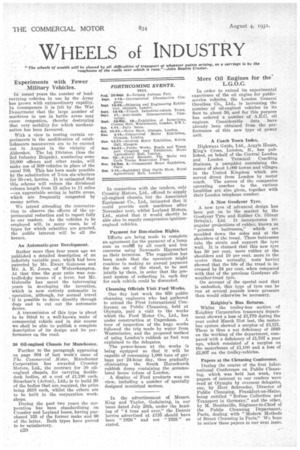
Page 43
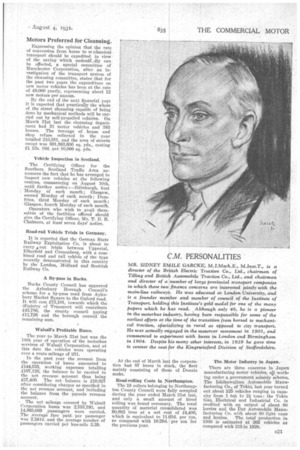
Page 44
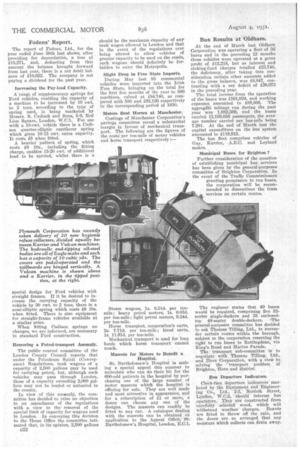
Page 45
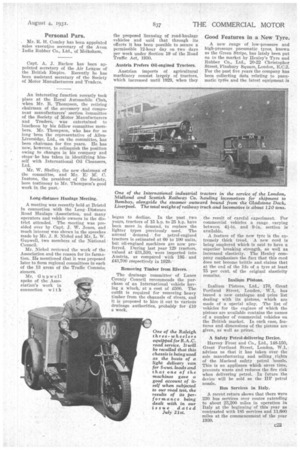
Page 46
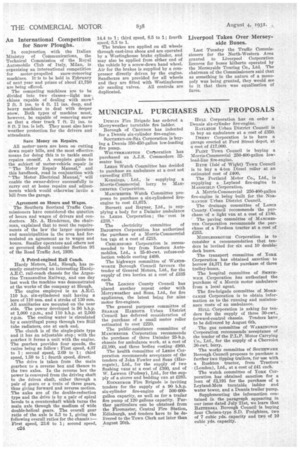
If you've noticed an error in this article please click here to report it so we can fix it.
by all difficulties of transport at whatever points arising, as a carriage is by The roughness of the roads over which it rans."—John Beattie Crozier.
Experiments with Fewer • -Military Vehicles.
In recent years the number of loadcarrying vehicles in use by the Army has grown with extraordinary rapidity. In consequence it is felt by the War Department that the large number of machines in use in battle areas may cause congestion, thereby destroying that very mobility for which mechanization has been favoured.
With a view to testing certain experiments in the modification of establishments manomvres are to be carried out in August in the vicinity of Aldershot. The 1st Division (less the 3rd Infantry Brigade), numbering some 18,000 officers and other ranks, will Make use of 500.vehicles in place of the usual 700. This has been made possible by the substitution of 3-ton six-wheelers for 30-cwt. lorries. It is estimated that this scheme will reduce the divisional column length from 15 miles to 11 miles —an appreciable saving in battle areas, which are frequently congested by enemy action.
We intend attending the concentralion to observe the effects of the experimental reduction and to report fully to our readers. As the vehicles to be employed will, in many cases, be of types for which subsidies are granted, the public interest will be all the keener.
An Automatic-gear Development.
Rather more than four years ago we published a detailed description of an infinitely variable gear, which bad been patented by Mr. Ewart Guinness and Mr. A. E. Jones, of Wolverhampton. At that time the gear ratio was controlled4by means of a lever, but Mr. Guinness has spent the intervening years in developing the invention, which is now entirely automatic in operation, although, for normal travel • it is possible to drive directly through dogs and to cut out the automatic device.
A transmission of this type is about to be fitted to a well-known make of commercial vehicle -and in due course we shall be able to publish a complete description of its design and its performance on the road.
30 011-engined Chassis for Manchester.
Further to the paragraph appearing on page 804 of last week's issue of The Commercial Motor, Manchester Corporation has awarded Crossley Motors, Ltd., the contract for 30 oilengined chassis, for carrying doubledeck bodies, at a cost of £1,180 each. Straehan's (Acton), Ltd.; is to build 20 of the bodies that are required, the price being £618 each, whilst the others are to be built in the corporation workshops.
During the past two years the corporation has been standardizing on Crossley and Leyland buses, having purchased 155 of the former make and 60 of the latter. Both types have proved to be satisfactory.
c20 In connection with the tenders, only Crossley Motors, Ltd., offered to supply oil-e.ngined chassis, but the Associated Equipment Co., Ltd., intimated that it could provide such machines after November next, whilst Leyland Motors, Ltd., stated that it would shortly be able also to supply compression-ignitionengined vehicles.
Payment for Bus-station Rights.
Efforts are being made to complete an agreement for the payment of a lump sum as rentat by all coach and bus concerns using Newcastle Haymarket as their terminus. The suggestion has been made that the operators might combine in making an annual payment for the use of the stand, to be met jointly by them, in order that the present system of collecting Is. each day for each vehicle could be discarded.
Cleansing Officials Visit Ford Works.
One day last week the 650 public cleansing engineers who had gathered to attend the First International Conference on Public Cleansing, held at Olympia, paid a visit to the works which the Ford Motor Co., Ltd., has under construction at Dagenham. A tour of inspection of the huge works followed the trip made by water from Westminster, and the proposed method of using London's rubbish as fuel was explained to the delegates.
The power-house at the works is being equipped so that it will be capable of consuming 1,000 tong of garbage per 24-hour day, thus gradually eliminating the South Hornchnrch rubbish dump containing the ACCUMOlated house refuse of London.
A display of Ford products was on view, including a number of specially designed municipal motors.
In the advertisement of Messrs. King and Taylor, Godalming, in our issue dated July 28th, under the heading of "4 tons and over," the Dennis lorries advertised at £135 should have been "1926" and not " 1928 " as stated.
More Oil Engines for the L.G.O.C.
In order to extend its experimental experience of the oil engine for publicservice vehicles, the London General Omnibus Co., Ltd., is increasing the number of oil-engined vehicles in its fleet to about 50, and for this purpose has ordered a number of A.E.C. oil engines. Considerable data have already been obtained from the performance of this new type of power unit.
A Coach Town Index.
Highways Guide, Ltd., Argyle Rouge, King's Cross, London, N., has published, on behalf of the Central London and London Terminal Coaching Stations, a pamphlet containing the names of about 1.000 towns and villages in the 'United Kingdom which are served direct from London by motor coach. The names of the companies operating coaches to the various localities are also given, together with their London telephone number.
• A New Goodyear Tyre.
A new tyre of advanced design has been put on to the market by the Goodyear Tyre and Rubber Co. (Great Britain), Ltd. It incorporates triangular projections of rubber, known as " prismed buttresses" which are moulded down the sides and at the shoulders of the tread. These buttresses take the strain and support the tyre wall. It is claimed that this new tyre has 50 per cent, more rubber at the shoulders and 10 per cent, more in the centre than normally, tests having showed that the life of the tread is increased by 24 per cent. -when compared with that of the previous Goodyear allweather-tread tyre.
On account of the special cord that is embodied, this type of tyre can be run at several pounds lower pressure than would otherwise be necessary.
Reighley's Bus Returns.
Whilgt the trolley-bus section of Keighley Corporation tramways department showed a loss of £3,770 during the year ended March 31st last, the motorbus system showed a surplus of £3,121. There is thus a net deficiency of £649 on the working of the department, compared with a deficiency of £1,707 a year ago, which consisted of a surplus on the motorbuses of £1,100 and a loss of £2,807 on the trolley-vehicles.
Papers at the Cleansing Conference.
During the course of the first International Conference on Public Cleansing, which was held last week, two papers of interest to our readers were read at Olympia by overseas delegates, one, by Herr Schroeder, Director of Public Cleansing, Frankfort-on-Maine. being entitled "Refuse Collection and Transport in Germany," and the other, by M. Boutteville, Engineer-in-Chief of the Public Cleansing Department, Paris, dealing with "Modern Methods of Street Cleansing in Paris." We hope to review these papers in our next issue.
Motors Preferred for Cleansing.
Expressing the opinion that the rate of conversion from horse to m?.chanical transport should be expedited in view of the saving which undoulLdly can be effected, a special committee of Manchester Corporation, after an investigation of the transport system of the cleansing committee, states that for the past two years the expenditure on new motor vehicles has been at the rate of £9,000 yearly, representing about 12 new motors per annum.
By the end of the next financial year it is expected that practically the whole of the street cleansing capable of being done by mechanical methods will be carried out by self-propelled vehicles. On March 31st last the cleansing department had 31 motor vehicles and 38.3 horses. The tonnage of house and shop refuse collected in the year totalled 210,381, and the area of streets swept was 891,893,600 sq. yds., costing £1 13s. 10d. per 10,000 sq. yds.
Vehicle Inspection in Scotland.
The Certifying Officer for the Southern Scotland Traffic Area announces the fact that he has arranged to inspect new vehicles at the following centres, commencing on August 10th, until further notice :—Edinburgh, first Monday of each month; Glasgow, second Monday of each month; Dumfries, third Monday of each month ; Glasgow, fourth Monday of each month.
Operators who wish to _avail themselves of the facilities offered should give the Certifying Officer, Mr. T. E. B. Chalmers, at least seven days' notice.
Road-rail Vehicle Trials in Germany.
It is reported that the German State Railway Exploitation Co. is about to carry A out trials between Uppertal, Elberfeld and Cronenberg, with a combined road and rail vehicle of the type recently demonstrated in this country by the London, Midland and Scottish Railway Co.
A By-pass in Bucks.
Bucks County Council has approved the Aylesbury Borough Council's scheme for a by-pass road from Aylesbury Market Square to the Oxford road. It will cost £73,101, towards which the Ministry of Transport will contribute £43,786, the county council paying £11,726 and the borough council the remaining sum.
Walsall's Profitable Buses.
The year to March 31st last was the 16th year of operation of the motorbus services of Walsall Corporation, and at this date the vehicles were operating over a route mileage of 231.
In the past year the revenue from the operation of buses amounted to £144,535, working expenses totalling £107,126, the balance to be carried to the net revenue account thus being £37,409. The net balance is £10,027 after considering charges as specified in the net revenue account, and including the balance from the parcels revenue account.
The net mileage covered by Walsall Corporation buses was 2,753,793, and 14,863,089 _passengers were carried. The average fare paid. per passenger was 2.241d. and the average number of passengers carried per bus-mile 5.39. • At the end of March last the corporation had 87 buses in stook, the fleet mainly consisting of those of Dennis make.
Road-rolling Costs in Northampton.
The 18 rollers belonging to Northampton County Council were fully occupied during the year ended March 31st last, and only a small amount of hired rolling was found necessary. The total quantity of material consolidated was 90,892 tons at a net cost of £4,406, which is equivalent to 11.63d. per ton, as compared with 10.29d. per ton for the previous year. The Motor Industry in Japan.
There are three concerns in Japan manufacturing motor vehicles, all working under a government subsidy scheme. The Ishikawajima Automobile Manufacturing Co., of Tokio, last year turned out about 125 vehicles ranging in capacity from 1 ton to 21 tons; the Tokio Gas, Electrical and Industrial Co. is credited with an output of about 80 lorries and the Dat Automobile Manufacturing Co. with about 60 light vans and lorries. The total production in 1930 is estimated at 265 vehicles as compared with 215 in 1929.
Fodens' Report.
The report of Fodens, Ltd., for the year ended June 30th last shows, after providing for depreciation, a loss of £15,271, and, deducting from this amount the balance brought forward from last year, there is a net debit balance of £10,622. The company is not paying a dividend for the past year.
Increasing the Pay-load Capacity.
A range of supplementary springs for Ford vehicles, enabling the capacity of a machine to be increased by 10 cwt, to 2 tons, according to the typo of spring used, is being marketed by Messrs. R. Cadisch and Sons, 5-6, Red Lion Square, London, W.C.1. For use with a 10-cwt. vehicle there is a Cadison quarter-elliptic cantilever spring which gives 10-15 cwt. extra capacity. It costs £8 when fitted.
A heavierpattern of spring, which costs £8 10s., including the fitting charge, enables 15-20 cwt, of additional load to be carried, whilst there is a special design for Ford vehicles with straight frames. If it be desired to increase the carrying capacity of the vehicle by 30 cwt. to 2 tons, there is a semi-elliptic spring which costs £9 10s. when fitted. There is also equipment for straight-frame vehicles available at a similar price,
When fitting Cadison springs no changes, we are informed, are necessary in standard Ford construction.
Removing a Petrol-transport Anomaly.
The public control committee of the London County Council reports that under the Petroleum Spirit (Conveyance) Regulations, tank wagons of a capacity of 2,500 gallons may be used for carrying petrol, but, although such vehicles may pass through London, those of a capacity exceeding 2,000 gallons may not be loaded or unloaded in the county.
In view of this anomaly, the committee has decided to raise no objection to an amendment of the regulations with a view to the removal of the special limit of capacity for wagons used in London. In conveying this decision to the Home Office the committee intimated that, in its opinion, 2,500 gallons
c22
should be the maximum capacity of anytank wagon allowed in London and that in the event of the regulations ever being altered to allow vehicles of greater capacity to be used on the roads, such wagons should definitely be forbidden to enter the Metropolis.
Slight Drop in Free State Imports. During May last 95 commercial vehicles were imported into the Irish Free State, bringing up the total for the first five months of the year to 566 machines, valued at £84,740, as compared with 580 and £82,126 respectively in the corresponding period of 1930.
Motors Beat Horses at Manchester. Costings of Manchester Corporation's pavings committee reveal a substantial margin in favour of mechanical transport. The following are the figures of the costs per ton-mile of motor vehicles and horse transport respectively:—
Steam wagons, 1s. 6.51d. per tonmile; heavy petrol motors, 1s. 0.03d. per ton-mile ; light petrol motors, 9.34d. per ton-mile.
Horse transport, corporation's carts, 2s. 7.71d. per ton-mile; hired carts, is. 11.61d. per ton:mile.
Mechanical transport is used for long hauls which horse transport cannot touch.
Mascots for Motors to Benefit a Hospital.
St. Bartholomew's Hospital is making a special appeal this summer to motorists who can do their bit for the 600-odd patients in the hospital by purchasing one of the large number of motor mascots which the hospital is offering for sale. They are well made and most attractive in appearance, and, for a subscription of £1 or more, a donor can choose any one of the designs. The mascots can readily bp fitted M any car. A catalogue dealing with the mascots can be obtained on application to the Appeal Office, $t: Bartholomew's Hospital, London, E.C.1.
Bus Results at 'Oldhatn.
At the end of March last Oldham Corporation was operating a fleet of 56 buses and in the preceding 12 months these vehicles were operated at a gross profit of £12,218, but as interest and sinking-fund charges totalled £23,746, the deficiency, after taking into consideration certain other amounts added to the gross balance, was £8,847, contrasting with a net deficit of £20,073 in the preceding year. ' The total income from the operation of the buses was £101,024, and working expenses amounted to £88,806. The aggregite mileage run during the past year was 1,682,599, and the buses carried 12,159,056 passengers, the average number carried per bus-mile being 7.281. At the end of March last the capital expenditure on the bus system amounted to £119,915.
The bus fleet comprises vehicles of Guy, Karrier, A.E.C. and Leyland makes.
Municipal Buses for Brighton ?
Further consideration of the question of establishing municipal bus services has been given by the general-purposes committee of Brighton Corporation. In the event of the Traffic Commissioners granting permission to run buses, the corporation will be recommended to discontinue the tram services on certain routes.
The engineer states that 40 buses would be required, comprising five 32seater single-deckers and 35 enclosedtop 48-seater double-deckers. '-The general-purposes committee has decided to ask Thomas Tilling, Ltd., to surrender certain routes within the borough, subject to the corporation reserving the right to run buses to Rottingdean, via King's Road and Marine Parade.
The transport sub-committee is to negotiate with Thomas Tilling, Ltd., and Hove Corporation, with a view to solving the transport problem of Brighton, Hove and district.
Bus Departure Indicators.
Clock-face departure indieators marketed by the Equipment and Engineering Co., Ltd., 2-3, Norfolk Street,
London, should interest bus operators. They are constructed from carefully selected wood, which will withstand weather changes. Boards -are fitted to throw off the rain, and the doors are so arranged that any moisture which collects can drain away.
Personal Pars.
. Mr. R. H. Comley has been appointed sales executive secretary of the Avon India Rubber Co., Ltd., of Melksham, Capt. A. J. Barlow has been appointed secretary of the Air League of the British Empire. Recently he has been assistant secretary of the Society of Motor Manufacturers and Traders.
An interesting function recently took place at the Royal Automobile Club, when Mr. B. Thompson, the retiring chairman of the accessory and component manufacturers' section Committee of the Society of Motor Manufacturers and Traders, was entertained to luncheon by his fellow committee members. Mr. Thompson, who has for so long been the representative of AllenLiversidge, Ltd., on the committee, has been chairman for five years. He has now, however, to relinquish the position owing to changes in his company and steps-he has taken in identifying himself with International Oil Cleansers, Ltd.
Mr. W. Shelley, the new chairman of the committee, and Mr. E. ivr. C. Instone, the president of the Society, bore testimony to Mr. Thompson's good work in the past.
Long-distance Haulage Meeting.
A meeting was recently held at Bristol in connection with the Long Distance Road Haulage Association, and. many operators and vehicle owners in the district attended. The meeting was presided over by Capt. J. W. Jones and much interest was shown in the speeches made by Mr. J. S. Nichol and Mr. L. W. Gupwell, two members of the National Council.
Mr. Nichol reviewed the work of the Association and the reascin for its formation. He mentioned that it was proposed later to form regional committees in each of the 13 areas of the Traffic Commis sioners. • Mr. Gupwell spoke of the Asso ciation's work in connection with the proposed licensing of road-haulage vehicles and said that through its efforts it has been possible to secure a permissible 12-hour day on two days per week under Section 19 of the Road Traffic Act, 1930.
Austria Prefers Oil-engined Tractors.
Austrian imports of agricultural machinery consist largely of tractors, which increased until 1929, when they
began to decline. In the past two years, tractors of 15 h.p. to 25 h.p. have been more in demand, to replace the lighter types previously used. The annual demand for petrol-engined tractors is estimated at 60 to 100 units, but oil-engined machines are now preferred. During last year 129 tractors, valued at i31,530, were imported into Austria, as compared with 195 and £43,700 respectively in 1929.
Removing Timber from Rivers.
The drainage 'committee. of Lanes County Council recommends the purchase of an International vehicle having a winch, at a cost of £500. The outfit is required for removing heavy timber from the channels of rivers, and it is proposed to hire it out to various drainage authorities, probably for £10 a week.
Good Features in a New Tyre.
A new range of low-pressure and high-pressure pneumatic tyres' known as the Green Stripe, has lately been put on to the market by Henley's Tyre and Rubber Co., Ltd., 20-22 Christopher Street, Finsbury Square, London, E.C.2. For the past five years the company has been collecting data relating to pneumatic tyres and the latest equipment is
the result of careful experiment For commercial vehicles a range varying between 41-in. and 9-in. section is available.
A feature of the new tyre is the extremely thick tread. A new cord is being employed which is said to have a superior breaking strength, as well as increased elasticity. The Henley company emphasizes the fact that this cord does not become brittle and claims that at the end of the life of a tyre at least 75 per cent. of the original elasticity remains.
Inalium Pistons.
Ludlum Pistons' Ltd., 170, Great Portland Street, London, W.1, has issued a new catalogue and price list dealing with its pistons, which are made of a special alloy. The list of vehicles for the engines of which the pistons are available contains the names of a number of commercial vehicles on the British market. In each case, features and dimensions of the pistons are given, as well as prices.
A Safety Petrol-delivering Device.
Harvey Frost and Co., Ltd., 148-150, Great Portland Street, Loudon, W.1, advises us that it has taken over the sole manufacturing and selling rights of the Macleod safety petrol °nozzle. This is an appliance which saves time, prevents waste and reduces the fire risk when delivering petrol. In future the device will be sold as the HF petrol nozzle.
Bus Services in Italy.
A recent return shows that there were 230 bus services over routes extending to about 23,200 miles in operation in Italy at the beginning of this year as contrasted with 185 services and 11,600 miles at the commencement of the year 1930.
An International Competition for Snow Ploughs.
In conjunction with the Italian Ministry of Communications, the Technical Commission of the Royal Automobile Club of Italy, Milan, is organizing an international competition for motor-propelled snow-removing machines. It-is to be held in February of next year and prizes of about £1,750 are being offered.
The competing machines are to be divided into two classes—light ma-. chines capable of dealing with snow 2 ft. 3 ins. to 4 ft. 11 ins, deep, and heavy machines to deal with deeper snow. Both types of machine must, however, be capable of removing snow so that a clear track 7 ft 24, ins. to 8 ft. 2 ins, is left. They must also have weather protection for the drivers and attendants.
Save Money on Repairs.
All motor users are keen on cutting down repair bills, and the most effective means for doing this is to tackle small repairs oneself. A complete guide to the subject of motor-vehicle repair is "The Motor Repair Manual," and this handbook, read in conjunction with "The Motor Electrical Manual," will enable the owner-driver successfully to carry out at home repairs and adjustments which would otherwise invite a bill from the garage.
Agreement on Hours and Wages.
The Southern Scotland Traffic Commissioners have considered the question of hours and wages of drivers and conductors. Mr. A. Henderson, the chairman, explained that to meet the requirements of the law the larger operators and municipalities in the area had formulated an agreement as to wages and hours. Smaller operators and others not so governed should consider Section 93 of the Road Traffic Act, 1930.
A Petrol-engined Rail Coach.
Hardy Motors, Ltd., Slough, has recently constructed an interesting HardyA.E.C. rail-coach chassis for the Argentine Transandine Railway, and one day last week the machine was demonstrated at the works of the company at Slough.
The engine employed is an A.E.C. 110 h.p. six-cylindered unit having a bore of 110 ram. and a stroke of 130 mm. MI auxiliaries are mounted on the near side. The power developed is 56 b.h.p. at 1,000 r.p.m., and 110 b.h.p. at 2,500 r.p.m. The cooling water is circulated by a centrifugal pump through two Still tube radiators, one at each end.
The clutch is of the single-plate type and it has an adjustable stop ; with the gearbox it forms a unit with the engine. The gearbox provides four speeds, the ratios being as follow : First speed, 4.37 to 1; second speed, 2.69 to 1; third speed, 1.59 to 1; fourth speed, direct.
The drive is taken from the main gearbox to a reverse box and thence to the two axles. In the reverse box the power is conveyed from the driving shaft to the driven shaft, either through a pair of gears or a train of three gears, thus giving forward and reverse motion. The axles are of the double-reduction type and the drive is by a pair of spiral bevels to a countershaft which turns the main axle through the medium of wide double-helical gears. The overall gear ratio of the axle is 5.3 to 1, giving the following overall ratios for the chassis :— First speed, 23.6 to 1; second speed, 14.4 to 1; third speed, 8.5 to 1; fourth speed, 5.3 to 1.
The brakes are applied on all wheels through cast-iron shoes and are operated by a Westinghouse brake cylinder, and may also be applied from either end of the vehicle by a screw-down hand wheel. Air for the brakes is supplied by a compressor directly driven by the engine. Sandboxes are provided for all wheels and they are fitted with Westinghouse air sanding valves. All controls are duplicated.
Liverpool Takes Over Merseyside Buses.
Last Tuesday the Traffic Commissioners for the North-Western Area granted to Liverpool Corporation licenees for buses hitherto operated by the Merseyside Touring Co., Ltd. The chairman of the Commissioners said that SS something in the nature of a monopoly was being granted, they would see to it that there was equalization of fares.












































































































